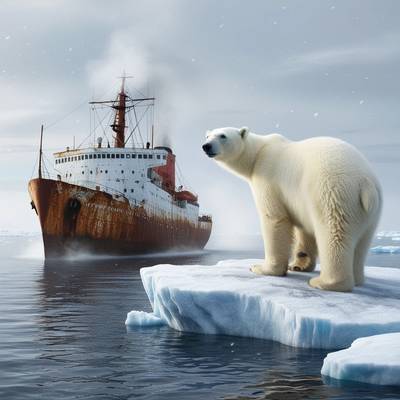Western Sanctions and the Arctic Route: Navigating New Challenges in Global Trade
Arctic Ocean - In a significant development for global shipping, Russia’s first oil shipment of the year has navigated through the Northern Sea Route (NSR) amidst ongoing Western sanctions. This move highlights the increasing strategic importance of the Arctic as a viable alternative for global trade routes and the complexities that come with it.
The Northern Sea Route
The Northern Sea Route, which runs along Russia’s Arctic coast from the Kara Sea to the Bering Strait, offers a shorter maritime path between Europe and Asia compared to traditional routes through the Suez Canal. The potential of the NSR has been increasingly recognized as climate change leads to reduced ice cover, making the route more navigable for longer periods each year.
The Impact of Western Sanctions
Western sanctions imposed on Russia in response to its actions in Ukraine have had profound effects on the country's economy and its access to international markets. These sanctions have targeted key sectors, including energy, finance, and shipping, aiming to isolate Russia economically and politically. However, Russia’s strategic pivot towards the Arctic demonstrates its efforts to mitigate the impact of these sanctions and maintain its role in global energy markets.
Russia’s Arctic Strategy
In response to the sanctions, Russia has intensified its focus on the Arctic, investing heavily in infrastructure and icebreaker fleets to ensure the NSR’s viability as a major shipping lane. The recent oil shipment through the NSR marks a significant milestone in these efforts. The use of the Arctic route not only reduces transit times but also circumvents some of the geopolitical chokepoints associated with traditional shipping routes.
Russian President Vladimir Putin has emphasized the Arctic's importance to Russia’s future economic development. “The Northern Sea Route is not just a transport corridor, it is a key to our sustainable development and economic security,” he stated in a recent address.
Environmental and Safety Concerns
The increased use of the NSR raises several environmental and safety concerns. The fragile Arctic ecosystem is particularly vulnerable to oil spills and other maritime accidents. The remoteness and harsh conditions of the Arctic also pose significant challenges for emergency response and salvage operations.
Environmental groups have voiced strong opposition to the increased shipping activity in the Arctic. “The risks associated with Arctic shipping are immense. The potential for devastating oil spills in such a fragile environment cannot be ignored,” warned Maria Larsson, a spokesperson for the Arctic Conservation Coalition.
Economic and Geopolitical Implications
The use of the NSR has significant economic and geopolitical implications. For Russia, it represents a means to sustain its energy exports and maintain economic stability despite Western sanctions. For global shipping, the NSR offers a valuable alternative that can reduce transit times and fuel costs, potentially reshaping global trade patterns.
However, the geopolitical implications are complex. The increased activity in the Arctic has heightened tensions between Russia and Western nations, particularly those with Arctic interests such as the United States, Canada, and Norway. There are concerns about the militarization of the Arctic and the potential for conflict over control and access to these strategic waters.
International Response
The international community has been closely monitoring the developments in the Arctic. The United Nations has called for cooperative and peaceful use of the Arctic waters, emphasizing the need for international agreements to ensure environmental protection and maritime safety.
Countries with Arctic interests are also increasing their presence in the region. The United States has announced plans to enhance its icebreaking capabilities and strengthen its Arctic strategy. Similarly, Canada and Nordic countries are bolstering their Arctic policies to protect their interests and ensure sustainable development in the region.
The Future of Arctic Shipping
The future of the NSR as a major global trade route depends on several factors, including climate change, geopolitical dynamics, and international cooperation. While the potential benefits are significant, the risks and challenges must be carefully managed.
Shipping companies are cautiously optimistic about the prospects of the NSR. “The Northern Sea Route offers exciting opportunities for reducing transit times and costs. However, it is crucial to address the environmental and safety concerns to ensure sustainable development,” said Lars Pedersen, CEO of Arctic Shipping Solutions.
Conclusion
The use of the Northern Sea Route by Russia amidst Western sanctions marks a pivotal moment in global shipping. As the Arctic becomes increasingly accessible, it is essential for the international community to navigate the complex economic, environmental, and geopolitical challenges. Through cooperation and careful planning, the potential of the Arctic can be harnessed while safeguarding its unique and fragile environment.








